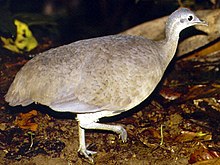Tinamus is a genus of birds in the tinamou family Tinamidae. This genus comprises some of the larger members of this South American family.
| Tinamus | |
|---|---|

| |
| Great tinamou (Tinamus major) | |
| Scientific classification | |
| Domain: | Eukaryota |
| Kingdom: | Animalia |
| Phylum: | Chordata |
| Class: | Aves |
| Infraclass: | Palaeognathae |
| Order: | Tinamiformes |
| Family: | Tinamidae |
| Subfamily: | Tinaminae |
| Genus: | Tinamus Hermann, 1783 |
| Type species | |
| Tetrao major[1] Gmelin, JF, 1789
| |
| Species | |
|
see text | |
Taxonomy
editThe genus Tinamus was introduced in 1783 by the French naturalist Johann Hermann.[2] The type species was subsequently designated as the great tinamou.[3][4] Hermann based his name on "Les Tinamous" used by Georges-Louis Leclerc, Comte de Buffon in his Histoire Naturelle des Oiseaux. The word "Tinamú" in the Carib language of French Guiana was used for the tinamous.[5][6]
The genus contains five species:[7][8]
| Common name | Scientific name and subspecies | Range | Size and ecology | IUCN status and estimated population |
|---|---|---|---|---|
| White-throated tinamou | Tinamus guttatus (Pelzeln, 1863) |
southeastern Colombia, southern Venezuela, Amazonian Brazil, and northern Bolivia |
Size: Habitat: Diet: |
NT
|
| Grey tinamou | Tinamus tao Temminck, 1815 |
northern and western Brazil, eastern Ecuador, eastern Peru, northern Bolivia, Colombia east of the Andes, northwestern and northeastern Venezuela, and northwestern Guyana |
Size: Habitat: Diet: |
VU
|
| Solitary tinamou | Tinamus solitarius (Vieillot, 1819) |
northeastern Argentina (Misiones), eastern Paraguay, eastern Brazil |
Size: Habitat: Diet: |
NT
|
| Black tinamou | Tinamus osgoodi Conover, 1949 Two subspecies
|
the Andes of southeastern Peru and the Andes of Colombia |
Size: Habitat: Diet: |
VU
|
| Great tinamou | Tinamus major (Gmelin, JF, 1789) Twelve subspecies
|
from southeastern Mexico through Panama, excluding Honduras and from Ecuador to French Guiana, parts of Brazil and northern Bolivia |
Size: Habitat: Diet: |
LC
|
References
edit- ^ "Tinamidae". aviansystematics.org. The Trust for Avian Systematics. Retrieved 2023-08-05.
- ^ Hermann, Johann (1783). Tabula affinitatum animalium olim academico specimine edita, nunc uberiore commentario illustrata cum annotationibus ad historiam naturalem animalium augendam facientibus. Argentorati [Strasbourg]: Impensis Joh. Georgii Treuttel. pp. 164, 235.
- ^ Apstein, C. (1915). "Nomina conservanda. Unter Mitwirkung zahlreicher Spezialisten herausgegeben". Sitzungsberichte der Gesellschaft Naturforschender Freunde zu Berlin (in German). 5: 119–202 [197].
- ^ Mayr, Ernst; Cottrell, G. William, eds. (1979). Check-List of Birds of the World. Vol. 1 (2nd ed.). Cambridge, Massachusetts: Museum of Comparative Zoology. p. 12.
- ^ Buffon, Georges-Louis Leclerc de (1778). "Le tinamou cendré". Histoire Naturelle des Oiseaux (in French). Vol. 4. Paris: De l'Imprimerie Royale. p. 502.
- ^ Jobling, James A. (2010). The Helm Dictionary of Scientific Bird Names. London: Christopher Helm. p. 386. ISBN 978-1-4081-2501-4.
- ^ Gill, Frank; Donsker, David; Rasmussen, Pamela, eds. (January 2022). "Ratites: Ostriches to tinamous". IOC World Bird List Version 12.1. International Ornithologists' Union. Retrieved 28 June 2022.
- ^ Clements, James (2007). The Clements Checklist of the Birds of the World (6 ed.). Ithaca, NY: Cornell University Press. ISBN 978-0-8014-4501-9.